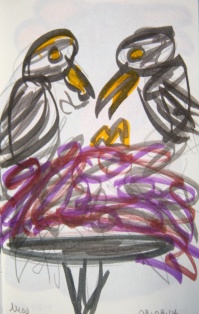Comments: A Beginner’s Guide
(for Al, again;
written tongue in cheek
as a follow-up to
Winning not Whining —
to be read cum grano salis)
When a poet enters a poetry competition, comments are sometimes offered as part of the fee for entering. These may be made by the judge(s) or by a pre-selection committee. The pre-selection committee, in large poetry competitions, will sometimes filter the many entries, sending a filtered short list through to the judges.
Filtering Committee

Basic rules of commenting (1):
Say nothing negative. Always find something positive to say. Whatever you do, do not turn the competitors away from future competitions. The organizers need the money the hopeful entrants provide.
Rhyme:
When faced with an entry that rhymes, the judge is encouraged to encourage the entrant to think of alternate forms of writing. Comments like: “Have you considered writing this poem in free verse?” or “This might work as a prose poem. Have you tried that format?” are considered better than “Your verse sucks”or “Your rhyming words make no sense except as rhyme words. Couldn’t you find anything else?” Equally abrupt and dismissive is “Read more rhyming poetry: your almost non-existent rhyme scheme needs national assistance.”
Free verse:
When faced with an entry in free verse, stick to the alternate approach “Have you considered making the poem rhyme?” or “This might work better as a prose poem.” Such comments are considered more acceptable and polished than “Stick to essay writing” or “Read more free verse: you need to understand where to put words in appropriate places on the page.” or “Blank spaces must have meaning.”
Judge Mark I

Individual words:
As soon as an unacceptable word is found, and in some cases the sooner the better, the entry may be rejected. Examples: Adverbs ending in -ly “Stephen King advises against the use of adverbs ending in -ly.” or less used words like upon or amongst or “Upon / amongst — so out of fashion: use your computer’s Thesaurus for contemporary expressions.” The commentator is advised against using chic continental expressions like very passé or très outmoded as they create a sense of absolute inferiority in the competitor. Latin and things like that should, ipso facto, never be countenanced as they may upset the competitor’s status quo.
Meaning:
If the judges cannot understand a word of what is before them, then phrases like very cryptic style or highly personal language are preferable to “Total nonsense.” or “Absolute Jabberwocky.” or “Never heard of Fowler?” or “This needs Footnotes.”
Punctuation:
The rules here are simple. If there’s punctuation, then suggest dropping it. If there is no punctuation, suggest adding it. Same thing with capital letters.
Judge Mark II

Length of submission:
Short poems can be dismissed with a comment like “You have some potential here: the poem could be lengthened in order to develop that potential.”
Long poems can be dismissed with comments like “The judge(s) find this a little bit wordy. You should consider shortening it.” Avoid attempted wit along the lines of “Nice: have you tried writing rhyming telegrams” or “This could (avoid should) be reduced to a rhyming couplet.”
Basic rules of commenting (2):
Find something positive to say and remember, sincerity has nothing to do with it; in fact, forget sincerity, unless you wish to end your comments with a phrase like “in sincerity”. If the judges are really at a loss for something positive to say, then a warm general comment will always be welcome. For example: “I love your use of the definite article.” “You have a wonderful way with small words.” or “All your commas are in the right places.” Such positivity will probably keep the competitor competing and the entrance money rolling in.
Beautiful, Jane. One to treasure. I must admit I never got (or gave) one of those! I did have, in my very, very early days “Young man, the Bible has already been written.” This was from Francis Scarfe, the Penguin translator of Charles Baudelaire.
LikeLike
You forgot: ‘this does not conform to the modern vernacular’ … A comment I received in the first contest I ever entered.
LikeLiked by 1 person
Roger, I see a story in your last drawing. Cleats on the bottom of the boots, striped rugby shirt, target on body, Arena or stadium for the head and two flags for opposing teams. Could my imagination possibly be running away with me?
LikeLiked by 1 person
On the country: those hobnails were made for walking, robot style, all over any opposition!
LikeLike
I don’t know how I turned “On the contrary … ” into “On the country … ” Old Men at Pevensey, I guess.
LikeLike
As soon as an unacceptable word is found, and in some cases the sooner the better, the entry may be rejected. Examples: Adverbs ending in -ly “Stephen King advises against the use of adverbs ending in -ly.” or less used words like upon or amongst or “Upon / amongst — so out of fashion: use your computer’s Thesaurus for contemporary expressions.”
That was humorously written amongst so many alternatively serious posts!
Loved this, Roger!
LikeLiked by 1 person
Thanks, Tanya. I am having so much fun with this blog and with all the new and beautiful people I am meeting. I haven’t got round to reading your story line and analysis article yet. Will do. I look forward to reading it.
LikeLiked by 1 person
In humour, veritas… 🙂
LikeLiked by 1 person
I forgot to dedicate it to you, Al. Error rectified in updated version.
LikeLiked by 1 person
You realise this makes me your muse… bet you never pictured your muse looking like this! 🙂
LikeLiked by 1 person
Amused by his muse he mused on his reply … well, guess we can’t have everything in this life …
LikeLiked by 1 person
Ha ha! I always pictured my muse looking like Jane Seymour as Solitaire in Bond… 😉
LikeLiked by 1 person
“Je les prends où je les trouve,” to paraphrase Molière. I think the crows in the garden inspire me as much as anything, right now, and the little chipmunk that visits my cat.
LikeLiked by 1 person
Excellent considerations; thank you! I found this quite helpful to read.
LikeLike
A pinch of salt and tongue in cheek … it does happen, though.
LikeLiked by 1 person